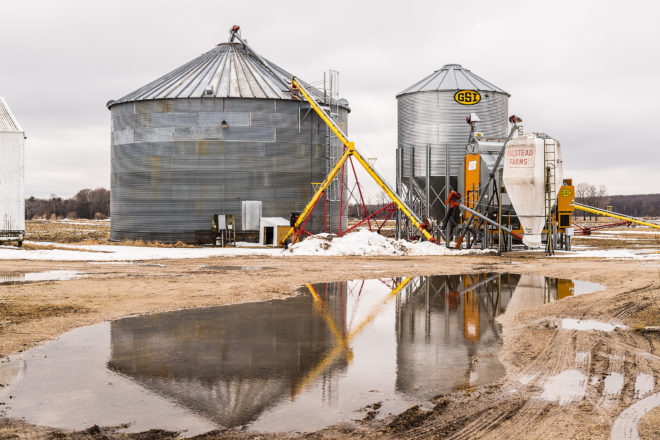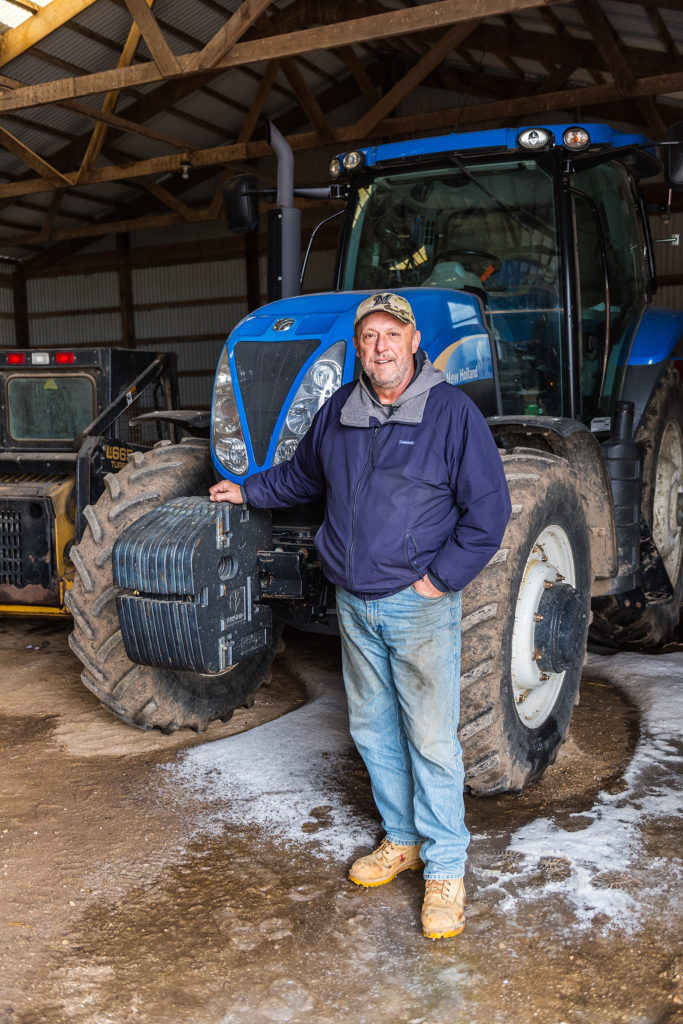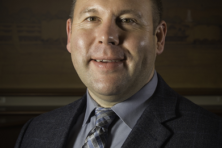Regulations Put Farmer on Different Path
- Share
- Tweet
- Pin
- Share

Six years ago this June, Jacksonport farmer Randy Halstead gave up dairy farming and has not looked back. In fact, he recalls 11 straight years of having to milk his herd twice a day without taking a vacation.
“Actually, I have a life now,” Halstead said about his post-dairy farming days. “I’ve got nine grandkids. I can go see them now when I want to.”
Regulations are what put an end to Halstead’s dairying.
“Soil and water called me up and wanted me to put up a storage basin for my milk house water,” he said. “I was 58 years old. I just decided it was time to pull the plug. I wasn’t going to spend $40,000 to use it for two years. It would have been 40 grand out of my pocket.”
It was, he said, an easy decision to get rid of the cows.
“In one week the cows were gone,” he said. “I found a guy to broker them and he found some buyers and they were gone. That was about the same time I decided to run for county board.”

Randy Halstead in tractor shed on his Jacksonport farm.
Halstead was already serving on the three-member Jacksonport Town Board when he challenged Dale Wiegand, the incumbent District 16 county board supervisor in the 2014 spring election, and won by a vote of 113 to 72. He was re-elected to the board on April 3, without a challenger.
“I enjoy county board,” he said. “It’s interesting. I think it’s good to have a farmer on there.”
He stops to think a minute and adds, “I guess I might be the only full-fledged farmer on the board.”
One of his committee assignments on the county board is serving on the Land Conservation Committee, which deals with, among other things, farming issues. Last September the committee was asked to vote on the state’s first targeted manure spreading rule for the karst region. Halstead and Mike VandenHouten, a citizen member of the committee who farms in Southern Door, voted against the changes in what turned out to be a 3-2 vote in support of the changes.
“I voted against strictly because I didn’t think they had a plan in place,” Halstead said. “I couldn’t support something where I didn’t know what the hell was going on. I think that was Mike’s reason, too.”
The Halsteads established themselves in Door County in 1874 when Randy’s great-grandfather came here from Canada.
“Originally, he had 80. He bought another 40 for 120 acres,” he said. “Then my grandfather and dad bought the farm we’re at now. That was 120 acres. In 1966 they bought my mother’s parents’ farm. That was another 120 acres.”
Today Randy has 400 acres and rents somewhere in the neighborhood of 300 acres for his crops.
Except for hiring someone to drive a truck for a few days during harvest, Halstead is a one-man operation.
“If you’ve got good equipment, you can do it yourself,” he said. “I used to have a hired man, but when I got rid of the cows, that was the end of that.”
When Halstead graduated from high school, he wasn’t sure he wanted to be a farmer. So he went to work at the shipyards.
“Absolutely hated it,” he said. “I was there for a year and three-quarters. There was a strike and I left and went on the road as a boilermaker, welding in power plants. I did that for about three years before I got fed up with it and came back to farming. Been with it ever since.”
He worked alongside his father, who retired at the age of 86.
While Halstead takes a lot of pride in his work, there are some aspects of farming that he is happy to pay someone else to do, such as accounting.
“I would rather pick stones than do accounting,” he said. “I hire someone to do that. It’s stressful for me and I don’t like doing it. There are a few things I’ll just farm out. It makes life easier.”
One advantage Halstead has over his forebearers is the ability to study the difficult commodities market in order to get the best price for his crops.
“It’s a big game. You really have to keep an eye on it,” he said. “Right now I’m basically checking the markets four times a day to see what’s going on. I’ve got my corn sold for June and July. I haven’t sold my soybeans for the last two years and I’m still sitting on last year’s wheat. And I’m debt free. That’s the way my dad taught me how to do it and I’ve stuck to it.”
Halstead is looking forward to planting cover crops, an idea he picked up at a meeting of Peninsula Pride Farms.
“I got the bug for cover crops,” he said. “A lot of farmers are doing that. No-till and cover crops in order to scavenge the nitrogen.”
He’s considering putting in oats, purple top turnips, daikon and crimson clover to produce nitrogen in the soil, allowing him to cut back on the use of commercial fertilizer.
“You leave the plants in and they break down and put organic matter into the soil,” he said. “Then you get less run off because it absorbs the rain.”
When he had cows, he would harvest the corn stalks along with the cobs for silage. Now he just harvests the cobs and lets the stalks remain to work back into the soil.
“I’m sure some people are reluctant to try new things like this,” he said. “It’s going to cost me a little bit of money to get set up for it, but I think it’s going to be a good thing. I’m going to be 64 in June and I’m just starting.”


